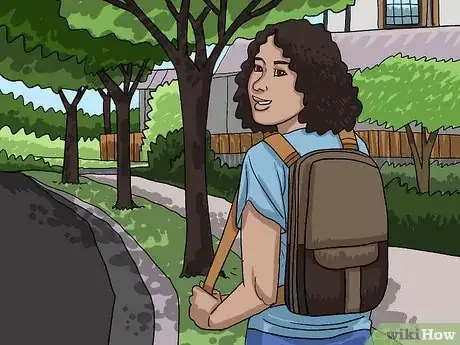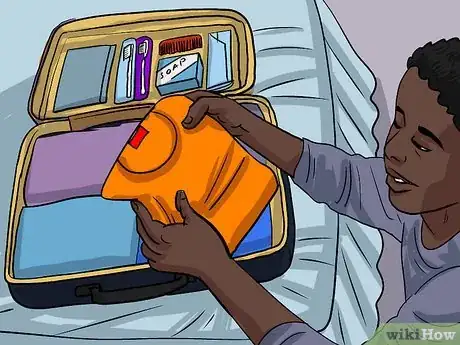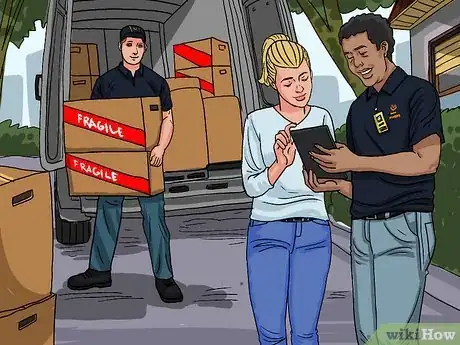X
wikiHow is a “wiki,” similar to Wikipedia, which means that many of our articles are co-written by multiple authors. To create this article, 18 people, some anonymous, worked to edit and improve it over time.
There are 11 references cited in this article, which can be found at the bottom of the page.
This article has been viewed 32,440 times.
Learn more...
Moving is often listed among the most stressful human experiences. You have to pack up an entire house, say goodbye to your friends, and start all over somewhere new. You may not be able to cut all the stress from your move, but you can find ways to make it easier. Give yourself plenty of time to make the transition, and take joy in setting up your new home.
Steps
Part 1
Part 1 of 3:
Coping with Stress
-
1Research your new hometown. Before you start packing your belongings take some time to get to know your new hometown. Look up the town online and see what they have to offer.[1]
- Make a list of your hobbies and see if your new hometown has a place for them. If you're into comic books, look for a comic book store. If you're into skateboarding, see if your new town has a skate park.[2]
- Look for things that set the town apart from other places. You may find some interesting facts about your new hometown. Share these things with your friends. Involve your friends in your moving experience to help ease the anxiety of moving.[3]
-
2Visit your new school. Ask your parents to let you visit your new school before you move. When you visit, ask about any clubs you might want to join. Try to get to know a little bit about what activities the school offers.[4]
- If you are moving in the middle of the school year, some of the clubs might be full, or deadlines may have passed for certain activities. Talk with the administration and see if they can find ways to get you involved.[5]
Advertisement -
3Get involved with the moving process. Ask your parents to make you a part of any pre-move visits. If they're going to look for a house, ask to go along. Seeing your new home may help you cope with the stress of moving.
- While you're visiting, take a look at your new neighborhood. Try to familiarize yourself with the town. Try to find a city map and highlight where you'll be living. Highlight where your new school will be, and any places you might want to visit.[6]
-
4Throw a going away party. Before you leave your new place, invite all your friends over and have one last get together. Share memories with your friends before you leave.[7]
-
5Take pictures of your house before you pack it away. A few weeks before you start packing, take some pictures to remind you of what it was like living there.[8]
- Take pictures of your family doing everyday things. Try to capture the experiences you had living in the house.
-
6Talk to your friends and family. If you're feeling nervous about moving, open up to your friends and family. Let them know what's on your mind, and ask them for support.[9]
- Make plans to visit your friends and family after the move. While you won't be able to see them as much as you used to, that doesn't mean you have to lose touch with them completely.[10]
- Make sure you give yourself plenty of time to say goodbye. Spend quality time with your friends and family. Visit your favorite hangouts and take walks through your neighborhood.
-
7Take care of yourself. Moving is stressful and time consuming, but don't let it get in the way of your health. In times of stress, it is especially important to eat well and get enough rest.[11]
- Set aside time to make healthy dinners. Invite friends over to help ease your stress.
- Your mental health is important as well. Don't focus on the negative aspects of moving. Think of the new experiences you'll have, and the new people you will meet. A positive outlook will help you get through the difficulties of moving.[12]
Advertisement
Part 2
Part 2 of 3:
Getting Used to Your New Home
-
1Accept the move. You may be going through a lot of different emotions during the move. Rather than fight the move, accept it, and learn from the experience.[13]
- You will experience change for the rest of your life. Don't let it get the best of you. Open yourself up to new experiences and try to stay positive. You have the opportunity for a fresh start. Join a new club at school, or try-out for one of the sports teams.[14]
-
2Stay close with your family. Don't push your family away because of stress. You may think your parents are trying to ruin your life by moving, but they are not. Your family moved as a whole, and you need to rely on each other.[15]
- Talk to your parents about any fears you might have. Reach out to them and use this time to build stronger family bonds.[16]
-
3Get your room set up. Getting your bedroom in order will help you settle down in your new home, and make you feel more at ease.[17]
- After you get your bedroom set up, start unpacking things that you know you'll need in the next few days. Help your parents with any moving related chores. Try to involve yourself in the moving process as much as you can.
-
4Establish a routine. Start getting familiar with your new home as soon as possible. Take walks around the neighborhood and introduce yourself to your neighbors.[18]
- Explore your new city. Seek out things to do to help you get comfortable in your new city. Try new restaurants or go to the park. See what your new town has to offer and go experience it.[19]
Advertisement
Part 3
Part 3 of 3:
Planning the Move
-
1Start planning as soon as possible. If you can afford to have some overlap between leases, you can take your time moving from one place to the next. It will cost you more money, but it may be worth it.[20]
- Try to give yourself at least a week of overlap. You may be able to talk to you landlord about paying a prorated rent rather than the full month.[21]
- You may not have the option to have any overlap, but you can still start the moving process early. Start packing nonessential items as soon as possible.[22]
- Make sure you have a strategy for packing. Set a schedule for yourself and check your progress. Don't let your move-out date sneak up on you.
-
2Get rid of things you don't need. Before you start throwing everything you own into boxes, take some time to sort your stuff. If you haven't used something in a long time, toss it.
- Donate the things you can't sell to a thrift store. You could also see if your friends need anything, and give some things to them.[23]
-
3Organize your boxes. As you pack up a room, remember to label the boxes. Write the contents of the box and what room it belongs in to make things easier. Remember to label breakable items as fragile.[24]
- Go to a grocery store and see if you can take some boxes from the back. If you can't find any free boxes, you can always buy some from moving supply stores.
-
4Pack a suitcase. When packing bedrooms, keep a suitcase on hand to store essential items. Pack toiletries and spare clothes as if you were taking a trip.[25]
-
5Hire movers. If you don't have the time, or the desire, to move yourself, hire some help. Ask friends and coworkers for recommendations.[26]
- Make sure the movers take a thorough inventory of what you plan to move. The bulk and weight of what you move will impact the cost of moving. Getting an accurate estimate will help you budget the rest of your move.[27]
- Check with the American Moving and Storage Association for a list of reliable movers.[28]
- If you can't afford to hire movers, see if you can get a few friends to help you with the move. Offer to buy them dinner afterwards to return the favor.
Advertisement
References
- ↑ http://kidshealth.org/teen/your_mind/emotions/moving.html#a_Making_the_Best_of_It
- ↑ http://kidshealth.org/teen/your_mind/emotions/moving.html#a_Making_the_Best_of_It
- ↑ http://kidshealth.org/teen/your_mind/emotions/moving.html#a_Making_the_Best_of_It
- ↑ http://kidshealth.org/teen/your_mind/emotions/moving.html#a_Making_the_Best_of_It
- ↑ http://kidshealth.org/teen/your_mind/emotions/moving.html#a_Making_the_Best_of_It
- ↑ http://kidshealth.org/teen/your_mind/emotions/moving.html#a_Making_the_Best_of_It
- ↑ http://militaryonesource.mil/cyt/communicating-with-your-pre-teen?content_id=266867
- ↑ http://militaryonesource.mil/cyt/communicating-with-your-pre-teen?content_id=266867
- ↑ https://experiencelife.com/article/how-to-handle-a-move/
- ↑ https://experiencelife.com/article/how-to-handle-a-move/
- ↑ https://www.psychologytoday.com/us/blog/the-in-between/201407/moving-out-leads-anxiety-introverts
- ↑ https://experiencelife.com/article/how-to-handle-a-move/
- ↑ https://www.psychologytoday.com/blog/teen-angst/201008/so-youre-the-new-kid-the-block-how-address-the-pressure-and-adjustment-moving
- ↑ https://www.psychologytoday.com/blog/teen-angst/201008/so-youre-the-new-kid-the-block-how-address-the-pressure-and-adjustment-moving
- ↑ https://www.psychologytoday.com/blog/teen-angst/201008/so-youre-the-new-kid-the-block-how-address-the-pressure-and-adjustment-moving
- ↑ https://www.psychologytoday.com/blog/teen-angst/201008/so-youre-the-new-kid-the-block-how-address-the-pressure-and-adjustment-moving
- ↑ http://childdevelopmentinfo.com/how-to-be-a-parent/communication/talk-to-kids-moving/
- ↑ https://experiencelife.com/article/how-to-handle-a-move/
- ↑ https://experiencelife.com/article/how-to-handle-a-move/
- ↑ https://www.psychologytoday.com/blog/triggered/201307/chaos-under-control-dealing-anxiety-about-moving
- ↑ https://www.psychologytoday.com/blog/triggered/201307/chaos-under-control-dealing-anxiety-about-moving
- ↑ https://www.psychologytoday.com/blog/triggered/201307/chaos-under-control-dealing-anxiety-about-moving
- ↑ http://kidshealth.org/teen/your_mind/emotions/moving.html#a_Packing_It_Up
- ↑ http://lifehacker.com/5591389/the-start-to-finish-moving-guide
- ↑ http://lifehacker.com/5591389/the-start-to-finish-moving-guide
- ↑ http://www.moving.com/tips/hiring-quality-movers/
- ↑ http://www.moving.com/tips/hiring-quality-movers/
- ↑ http://www.moving.com/tips/hiring-quality-movers/
About This Article
Advertisement





































































